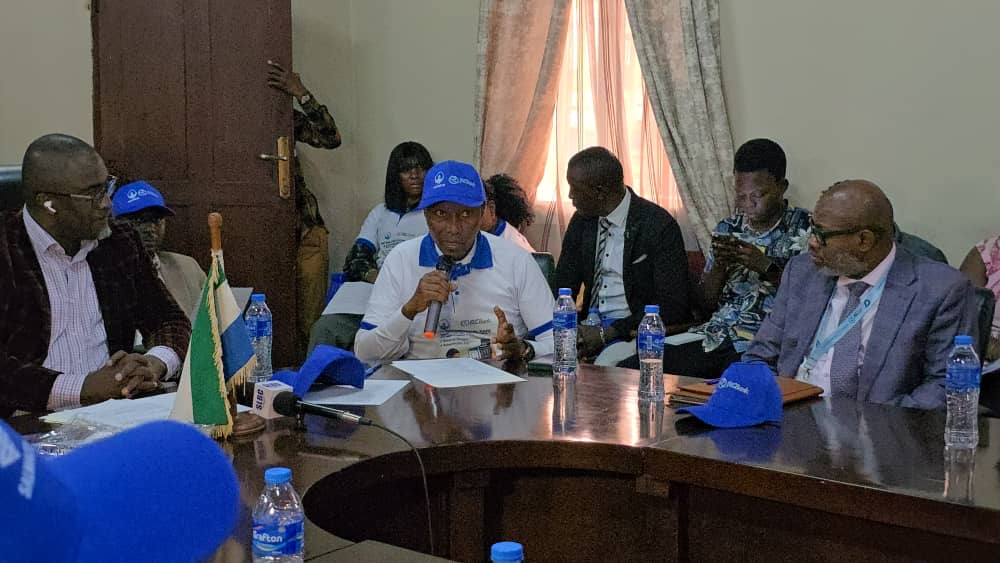In a major step toward improving public utility services, the Sierra Leone Water Company (SALWACO) has launched a digital water bill payment system in partnership with Rokel Commercial Bank (RCB). The initiative, unveiled in Freetown under the theme “Paying for Clean, Safe, and Affordable Water Just Got Easier,” aims to streamline bill payments and make water services more accessible across the country.
The system will enable customers to pay their water bills via RCB’s Simkorpor and Rokel Mobile App platforms, eliminating the need for long queues or travel, particularly in rural communities.
Welcoming participants to the launch event, SALWACO’s Senior Communications Officer, Sheku Putka Kamara, introduced the ceremony’s chairperson, followed by a warm opening address from SALWACO’s Deputy Managing Director, Apostle Dr. Albert Harrison Harvey. He emphasized the company’s ongoing efforts to modernize service delivery and enhance customer satisfaction.
SALWACO’s Director of Commercial Services, Mohamed Aziz Waggay, provided an overview of the initiative, noting that the previous billing systems were inefficient and costly, particularly for customers outside the capital. “With this digital payment platform, we’re making things faster, easier, and more convenient for all our customers—especially those in the regions,” he stated.
Delivering a goodwill message on behalf of Rokel Commercial Bank, Madam Zakiatu Dickson highlighted RCB’s commitment to innovation and financial inclusion. “This partnership demonstrates our shared goal of national development and accessible service delivery for all Sierra Leoneans,” she said.
Mrs. Mary Mansaray Ngegba, Director of Communications, Gender & Outreach at SALWACO, reflected on the progress the institution has made over two decades and praised the transformative power of such partnerships.
Representing the National Water Resources Management Agency (NWRMA), Alpha Swaray applauded the collaboration as a financial and operational breakthrough. “This will strengthen SALWACO’s revenue collection and enable better water access across the country,” he said.
Hon. Sama Sandi, Deputy Director General of the Electricity and Water Regulatory Commission (EWRC), reaffirmed the Commission’s support and referenced its “4 As” guiding principle—Availability, Accessibility, Affordability, and Accountability. “This partnership is a game-changer in ensuring sustainable water provision,” he noted.
Speaking on behalf of RCB’s Managing Director, Abdul Rahman Mahdi, the bank’s Director of Business Development, said the partnership is part of the bank’s digital transformation. “Now, with a phone and internet access, paying water bills is just a click away. Even non-RCB customers can make payments. We are working towards full financial inclusion,” Mahdi explained, adding that the initiative also supports the Sustainable Development Goal 6 (Clean Water and Sanitation).
Chairman of SALWACO’s Board of Directors, Joseph Joe Ndanema, lauded both institutions for a forward-thinking partnership. “This is about more than just revenue—it’s about making life better for our people,” he said.
In his keynote address, delivered on behalf of the Minister of Water Resources and Sanitation, the ministry’s Permanent Secretary, Mr. Alie Bakarr Conteh, officially launched the Simkorpor and Rokel Mobile App platforms as tools for digital payments in the water sector. He commended the project as a significant move toward achieving the objectives of the national development plan, especially in water access and WASH goals.
SALWACO’s Managing Director, Ing. George Lamin Vandi, closed the formal addresses by announcing upcoming partnerships with additional mobile money providers like Orange Money, aimed at expanding digital access and increasing efficiency. “This is just the beginning,” he said. “We’re building a digital payment ecosystem that works for everyone.”
The event concluded with a vote of thanks by SALWACO’s Planning and Policy Manager, Chrisla Koroma, followed by a group photo session to mark the launch.
As Sierra Leone continues to navigate water infrastructure challenges, this digital partnership is expected to play a vital role in improving payment systems and expanding clean water access nationwide.
By Elizabeth Kamara



